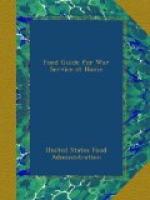Many of the substitute cereals do not keep so well as wheat, especially if they contain more than a minimum of moisture and fat. The housekeeper and the baker should therefore buy them in small enough quantities to use them up promptly and should keep them in a cool, well-ventilated place. May and June and the summer months are the time when most care is needed.
It is the free use of these many wholesome substitutes that is making possible the necessary saving of wheat. We who appreciate their wholesomeness and their value can well break away from our wheat habit and gladly make the little effort sometimes necessary to begin using newer foods.
CHAPTER III
WAR BREAD
Bread is the staff of life for all nations. But “bread” does not necessarily mean the wheat loaf. At one time and place it has been barley cake, at another oaten cake, and at another corn pone. Bread has always been whatever cereal happened to be convenient. Even such unbreadlike food as rice is to some races what bread is to us.
Why, then, have we developed our wheat-bread habit? Partly because wheat bread has been easy to get and we have grown to like the taste, but chiefly because wheat flour gives the lightest loaf. To understand why, make a dough with a little white flour and water and then gently knead it in cold water. The consistency changes, the starch is washed out and a rubbery, sticky ball is left—the gluten, which is the protein of the wheat. It is this gluten in the flour that stretches when bread rises and then stiffens when it is baked, making a light, porous loaf. Wheat is the only one of the cereals that has much gluten; rye has a little and the others practically none.
Gluten seems to be essential to the making of a light, yeast-raised loaf. Products raised with baking-powder, for which our standard of lightness is different—“quick breads” like biscuits and muffins and cakes—do not require the gluten and can easily be made from substitute cereals. But for our ordinary loaf of bread, at least some wheat seems to be almost essential, though with skill in the making, rye can be made to serve in its place. Patriotic bakers and housewives all over the country have been trying to produce a wheatless loaf which is light, palatable, and sufficiently durable to stand transportation. The durability is a very important consideration; crumbly corn bread cannot be distributed by bakers nor served to armies. Corn bread and the other quick breads are chiefly home-made products.
OUR PRESENT PROBLEM, THEREFORE, IS TO MAKE THE MOST EFFECTIVE POSSIBLE USE OF OUR WHEAT GLUTEN, TO MAKE IT GO AS FAR AS POSSIBLE IN OUR BREADS. BOTH BAKERS AND PRIVATE INDIVIDUALS HAVE THEIR SHARE IN SOLVING THE PROBLEM.




